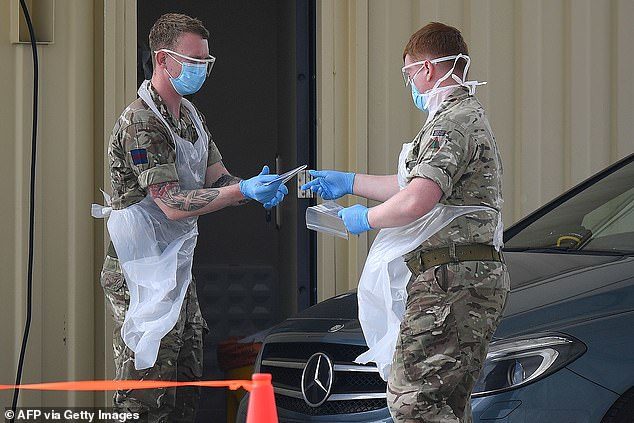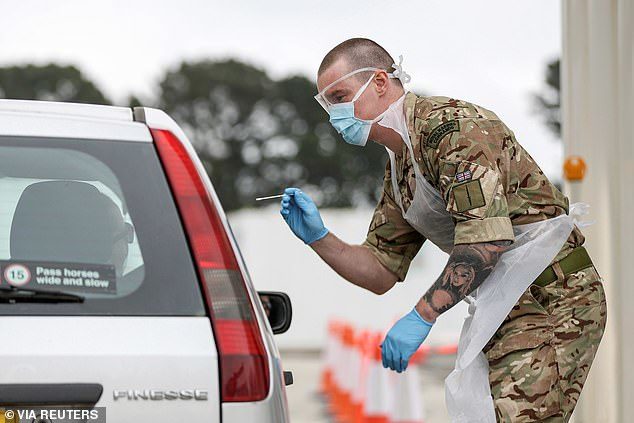Kommentar: ... hvilket betyder, at det er det, de kommer til at rulle ud overalt (på tværs af NATO-stan, i det mindste).

At reagere hurtigt på udbrud i skoler, på plejehjem og arbejdspladser er "helt afgørende" for at lette restriktionerne, sagde professor John Newton.
Snesevis af mobile testenheder vil være klar inden næste måned som en del af et kontaktsporings- og testprogram for at få Storbritannien til at flytte igen, fortalte han til Daily Mail.
Der er allerede 48 mobile enheder i drift, der drives af de væbnede styrker for at teste nøglemedarbejdere for coronavirus i fængsler, politistationer og plejehjem.
Disse enheder - en del af et forsøg på at nå regeringens mål om at gennemføre 100.000 test om dagen inden fredag - vil blive fordoblet til 96 inden for få dage.
Når ministrene er klar til at ophæve nedlukningen, skiftes deres fokus til målrettet udbrudskontrol som en del af et "test- og sporingssystem".
Kommentar: Delvist oversat af Sott.net fra Medical Martial Law: UK to send military units to 'COVID-19 outbreaks' for 'contact tracing & mass testing'... for next FOUR YEARS
Professor Newton also revealed the NHS has started randomly testing staff - even those without symptoms - in a bid to quickly stop outbreaks in hospitals.
Officials are talking to commercial call centres about setting up an army of 18,000 contact tracers who will rapidly track down anyone exposed to the virus.
Ministers hope contact tracing and testing - designed to locate hotspots and stop outbreaks before they grow - will be the 'safety net' that allows the Government to lift restrictions while avoiding a second virus wave.
Home testing, with swabs sent via Amazon to anyone with symptoms, will be an essential element of this. Countries such as South Korea and Singapore have shown they can significantly restrict the spread of the virus using a 'test, track and trace' system.
Professor Newton stressed that for now the 'strategy is to get the incidence of coronavirus right down to a much lower level so it is no longer spreading widely in the community, then we will use contact tracing to contain any infection that does occur'.
He said: 'The numbers developing new coronavirus infections has fallen dramatically. We're very confident that when we are able to relax social distancing - not now but when we are able to - the testing processes we set up will support government strategy.
'Making testing really accessible will be the key to getting it done quickly, which is what will help support control of infection - that's absolutely crucial.'
He added: 'You need to be able to target your testing where there are outbreaks. The system we have built where you deliver a test to someone's home is ideally placed to do that.
'But if you had an outbreak in a care home, we would send the mobile unit in and test everybody in the care home. If you had an outbreak in a school, you would send the mobile unit to test everybody in the school.'
While mass contact tracing is yet to begin, a project to randomly test NHS staff has started.
'It's very important to control the spread of coronavirus in the hospital setting,' said Professor Newton, who was seconded last month from his role as director of health improvement at Public Health England to run the Government's testing programme.
'Rightly that's a priority so that does involve testing asymptomatic staff to find out whether they might have the virus. We want to get the NHS back to normal. So we want to test staff in certain settings - for example, care of cancer patients or care of renal transplant patients - just to give everyone their level of confidence that patients are safe to be treated in those environments.
'It's an important programme - it's just getting going but it's definitely something that is going to play a part in the future.'
Dominic Harrison, director of public health at Blackburn with Darwen Council, said last week contact tracing would have to be in place until 2024 to stop outbreaks getting out of control.
The Government is also running a scheme with Oxford University to repeatedly test 300,000 people over the next year. It aims to assess levels of the virus and immunity among the population.
Government adviser Neil Ferguson, of Imperial College, yesterday urged ministers to adopt the South Korean contact tracing approach.
The academic designed the computer modelling on which the lockdown was based and said he expected to hand ministers a new model 'within days'.
In an interview with the website UnHerd, Professor Ferguson said: 'The country we should be looking at is South Korea. Lockdown is not sustainable long term.
'If we can get case numbers down low enough, then I think we can look to the Korean model of how we can sustain control of transmission long term.
'That has many benefits. It's not certain we can achieve it but it is something we need to try given the economic, social and every other cost of lockdown.'




Kommentar: Oh NOW the prat recommends no lockdown. AFTER the country's wrecked. What a genius. Give 'im another PhD.
See also: